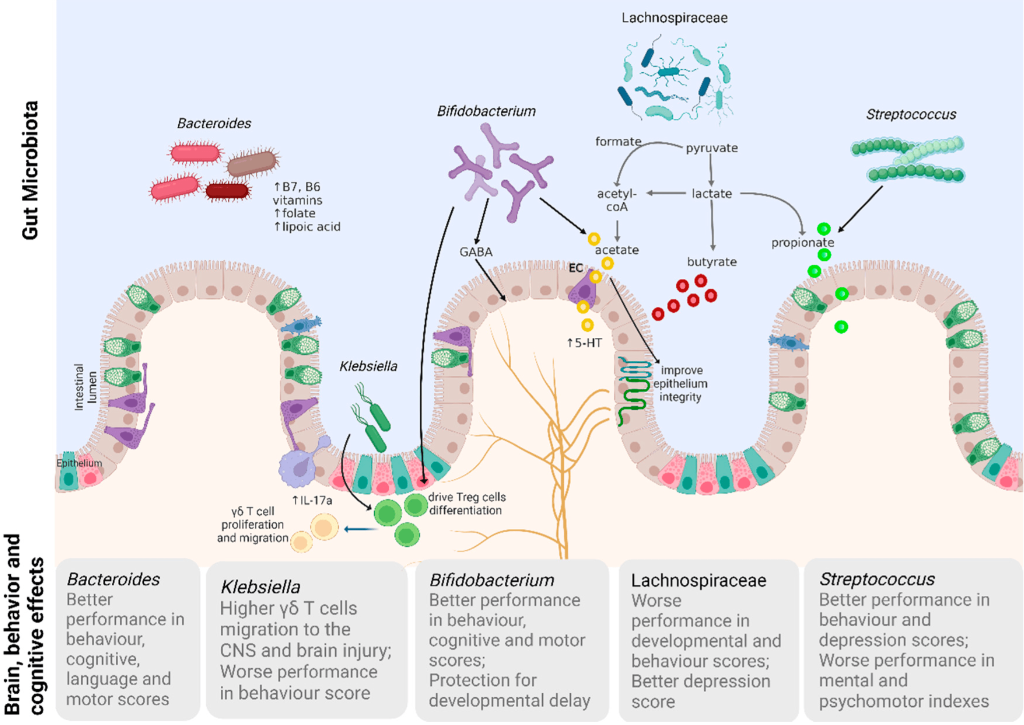💡 This scientific report reviews 23 studies investigating the relationship between the gut microbiome in early life, specifically during the first thousand days, and neurodevelopmental outcomes in infants. The goal is to identify key microbiome players and mechanisms influencing brain development and to explore potential associations with mental and neurodegenerative disorders.
📍 Methods: The systematic review considered studies reporting on the early life gut microbiome and its correlation with neurodevelopmental outcomes. The analysis involved evaluating microbial taxa, their abundance, and potential mechanistic insights. Genomic data, species associations, and functional pathways related to brain development were examined.
📍 Key Scientific Findings:
📌 Impactful Microbial Players: 𝘉𝘢𝘤𝘵𝘦𝘳𝘰𝘪𝘥𝘦𝘴 𝘢𝘯𝘥 𝘉𝘪𝘧𝘪𝘥𝘰𝘣𝘢𝘤𝘵𝘦𝘳𝘪𝘶𝘮 were consistently associated with positive neurodevelopmental outcomes. 𝘓𝘢𝘤𝘩𝘯𝘰𝘴𝘱𝘪𝘳𝘢𝘤𝘦𝘢𝘦, 𝘚𝘵𝘳𝘦𝘱𝘵𝘰𝘤𝘰𝘤𝘤𝘶𝘴, 𝘢𝘯𝘥 𝘍𝘢𝘦𝘤𝘢𝘭𝘪𝘣𝘢𝘤𝘵𝘦𝘳𝘪𝘶𝘮 demonstrated variable influences on behavior and brain development.
📌 𝘉𝘢𝘤𝘵𝘦𝘳𝘰𝘪𝘥𝘦𝘴 – Functional Insights: 𝘉𝘢𝘤𝘵𝘦𝘳𝘰𝘪𝘥𝘦𝘴, abundant in infant gut microbiota, plays a crucial role in metabolizing human milk oligosaccharides (HMOs), mucin, and complex polysaccharides. Functional genes in 𝘉𝘢𝘤𝘵𝘦𝘳𝘰𝘪𝘥𝘦𝘴 are related to the biosynthesis of short-chain fatty acids (SCFA), vitamin B6, folate, biotin, and lipoic acid.
📌 𝘉𝘪𝘧𝘪𝘥𝘰𝘣𝘢𝘤𝘵𝘦𝘳𝘪𝘶𝘮 – Neuroactive Substances: 𝘉𝘪𝘧𝘪𝘥𝘰𝘣𝘢𝘤𝘵𝘦𝘳𝘪𝘶𝘮, known for lactate and acetate production, stimulates serotonin secretion, impacting enteric nervous system and gastrointestinal function. Acetate produced by 𝘉𝘪𝘧𝘪𝘥𝘰𝘣𝘢𝘤𝘵𝘦𝘳𝘪𝘶𝘮 can drive Treg cell differentiation, contributing to immune maturation in neonates.
📌 Microbiome Metabolites and Neurodevelopment: Short-chain fatty acids (SCFAs), including butyrate, propionate, and acetate, influence specific cell types in the central nervous system, such as microglial cells. SCFAs facilitate neural precursor cell proliferation and may play a role in maternal gut microbiota influencing embryonic brain development.
📌 Influence of Gut Microbiome on Immune Response: Microbiota products, triggering the host’s immune response, can lead to the production of cytokines and inflammatory mediators affecting neurophysiology. Immunomodulatory bacterial products, such as those from 𝘍𝘢𝘦𝘤𝘢𝘭𝘪𝘣𝘢𝘤𝘵𝘦𝘳𝘪𝘶𝘮 𝘱𝘳𝘢𝘶𝘴𝘯𝘪𝘵𝘻𝘪𝘪, can have anti-inflammatory effects.
📌 Sex Differences and Microbiome: Studies reported sex-specific effects, with males potentially being more susceptible to microbiome influences. Variability in results across studies may be attributed to differences in neurodevelopmental susceptibility windows and dynamics of the infant gut microbiome.
📌 Functional Pathways and Mechanisms: Limited studies provided mechanistic insights, linking microbiome functionality to NAD salvage, aspartate/asparagine biosynthesis, methanogenesis, bile acid transformation, SCFA production, and microbial virulence genes.
📍 This comprehensive review emphasizes the pivotal role of the gut microbiome in early life in influencing neurodevelopmental outcomes. 𝘉𝘢𝘤𝘵𝘦𝘳𝘰𝘪𝘥𝘦𝘴 𝘢𝘯𝘥 𝘉𝘪𝘧𝘪𝘥𝘰𝘣𝘢𝘤𝘵𝘦𝘳𝘪𝘶𝘮 are consistently associated with positive effects, while other taxa show variable influences. Mechanistic insights, particularly related to functional pathways, remain an area of exploration.
The report underscores the need for further studies, robust data analysis, and integration techniques to unravel the complexities of the microbiome–gut–brain axis during the critical first thousand days of life. Understanding these interactions can pave the way for interventions targeting the microbiome to positively impact neurodevelopment.
Link to the article : http://tinyurl.com/48ez3xp5
